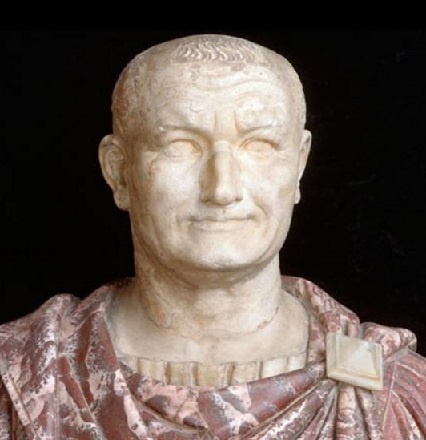
b. 17 Nov 9 AD; d. 23 Jun 79.
Roman emperor from 69-79 AD, Vespasian was the general putting down the Jewish Revolt when he was proclaimed emperor by his troops. Leaving his son, Titus to mop up the revolt he left Palestine for Egypt to plot his journey to the throne. He returned to Rome upon the defeat and murder of Vitellius and reigned as emperor until his death in 79. He founded the Flavian dynasty and was succeeded, upon his death, by his son, Titus.

Titus Flavius Vespasianus was born into a humble family. Growing up in the shadow of a capable older brother, Vespasian, however, proved himself capable enough as a military leader to be given charge of the left wing in the Roman invasion of Britain, in which role he conquered the southern region as far as Devon for Rome. In 51 he was made consul. Despite falling asleep when Nero was giving one of his artistic performances in Greece in 66, Nero appointed him to take charge of putting down the Jewish Revolt that had just then broken out. The main opposition in Judea had already been subdued when Nero died in 68. In the year that followed three emperors claimed the imperial throne. When his troops proclaimed the emperorship for him, he left the more dramatic champaign of taking Jerusalem to his son, Titus, and proceeded to Alexandria to plot the rest of the journey to Rome. When his forces had defeated Vitellius's, and Vitellius was himself murdered, he returned to Rome in October 70 to claim his prize.
The disastrous reign of Nero left a pile of problems for Vespasian. Nero's lavishly wasteful lifestyle left the imperial coffer bankrupt and had to replenished. Vespasian accomplished that. The fighting for the imperial throne after Nero's death left the imperial armies disunited and had to be brought back to order and discipline. Vespasian accomplished that. Then he established his own Flavian dynasty and ensured that future dynastic changes would be peaceful and orderly. His succession first by Titus, and then by his younger son Domitian accomplished that. The most concrete memorial to be found in Rome today to mark Vespasian's reign is the Colosseum, built from the proceeds of the loot from the Jewish war and to celebrate its victory. Less concrete but no less significant is Flavius Josephus who adopted Vespasian's family name as his own and remained for many years his ward in Rome where he wrote his famous Jewish War and other works.

©ALBERITH